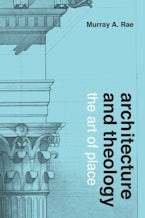Murray Rae is one of the most lucid, no-nonsense, and reliable theologians of his generation, and here he turns his attention to something he is eminently qualified to address. At last, we have a piece of writing on theology and the spatial arts that is genuinely theological while also being immersed in the realities of architectural theory, practice, and history. First-rate in every way.
~Jeremy Begbie, Thomas A. Langford Research Professor of Theology, Duke University
Architecture and Theology is more than a much-needed theology of architecture. It is an invitation to renew our understanding of God through the architect's eye. Murray Rae shows us how the built environment and spatial arts can transform the theological imagination. Accept his invitation into this space. God's place in your life will never be the same.
~William Storrar, Director, Center of Theological Inquiry, Princeton University
In the course of his exploration of how architecture might engage theology, Rae provides an effective critique of modernity and its emphasis on individualism and rationalism, its rejection of history and tradition, and its dualistic rejection of the material world.
~Claude N. Stulting, Jr., Reading Religion
Architecture and Theology opens with a lucid exploration of what 'dwelling' means for communities, and moves towards ways of understanding freedom, renewal, belonging, and time by showing how theological architecture is, and how architectural theology is.
~Ayla Lepine, Church Times
Murray Rae's most recent book, Architecture and Theology: The Art of Place, is a storehouse of insight. Though the book's title may seem to suggest an exclusive audience, thoughtful readers from all disciplines would find this work worth their time. For those with artistic sensibilities, Rae's work is an absolute delight. For others, for whom art and architecture are simply curiosities, his work is a warm invitation to look more closely at the world we inhabit as well as a guide for discovering wonders in the woodwork and 'angels in the architecture.'
~Jessica J. Schroeder, Denver Journal
Here is a book that repays attention. It ranges widely, and in the end it left me with the appealing thought that architecture could well be an art form that articulates both our need for redemption as well as our need to perceive that we dwell in an ordered cosmos.
~Christopher Irvine, Art and Christianity
Rae does indeed survey a remarkable number of architectural concepts, models for urban development, and spans the history of architecture from classical Greece to the still incomplete Sagrada Família Basilica. That he does so without overwhelming the architectural novice is noteworthy; that he can simultaneously offer a thorough and thoughtful engagement with theology, ethics, and postmodern philosophy is nothing short of remarkable.
~Sara E. Evans, Pacific Journal of Theological Research
…This impressive work draws not only on extensive reading of recent literature on the theory and history of architecture but also on the author’s own early experience as an architectural student at Auckland in 1984. As such, it represents a sustained attempt to interpret architecture in terms of the theology that he now sees as his principal field of expertise.
~David Brown, The Journal of Theological Studies
This lucid, thoughtful and wide-ranging work of scholarship is a first-rate example in theology of what the author enables us to see in good architecture: creative yet faithful innovation on the tradition.
~John Inge, Theology
Murray Rae, in Architecture and Theology: The Art of Place, sees our artistic culture as fortuitous: looking at wordless architecture and place may open new theological insight; and this present artistic culture can be engaged in the making of buildings and places, theologically.
~Christopher C. Miller, International Journal of Systematic Theology
It is very helpful to have a book that continues to call attention to the close relationship between architecture and theology. The relationship has been at the heart of our human understanding since the beginning of time. This book continues in that lineage as a testament to an enduring conversation that persists in the 21st century and beyond.
~Karla Cavarra Britton, Faith and Form
…a stimulating contribution to the discussion which will repay study by anyone interested in this theme.
~Tim Gorringe, Scottish Journal of Theology

